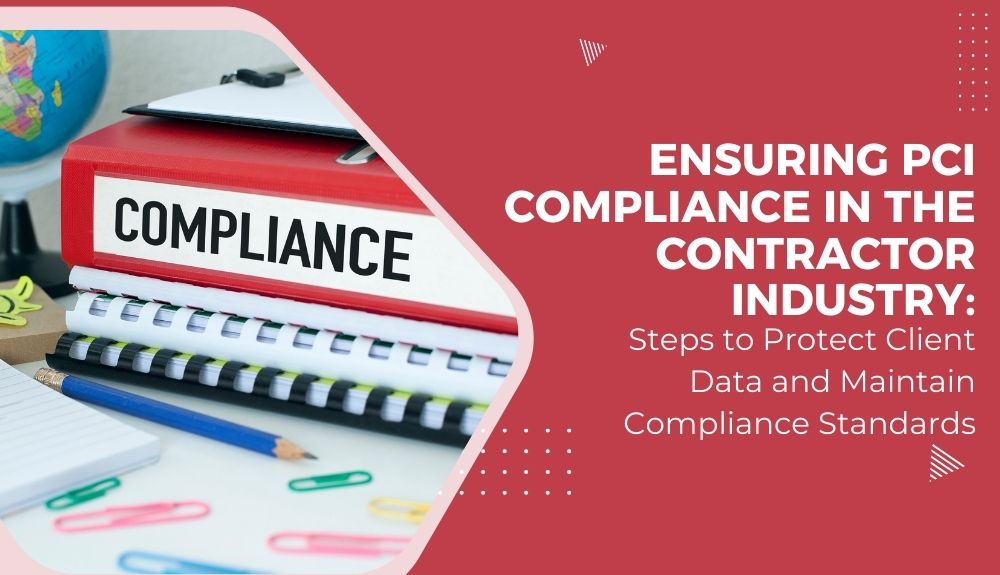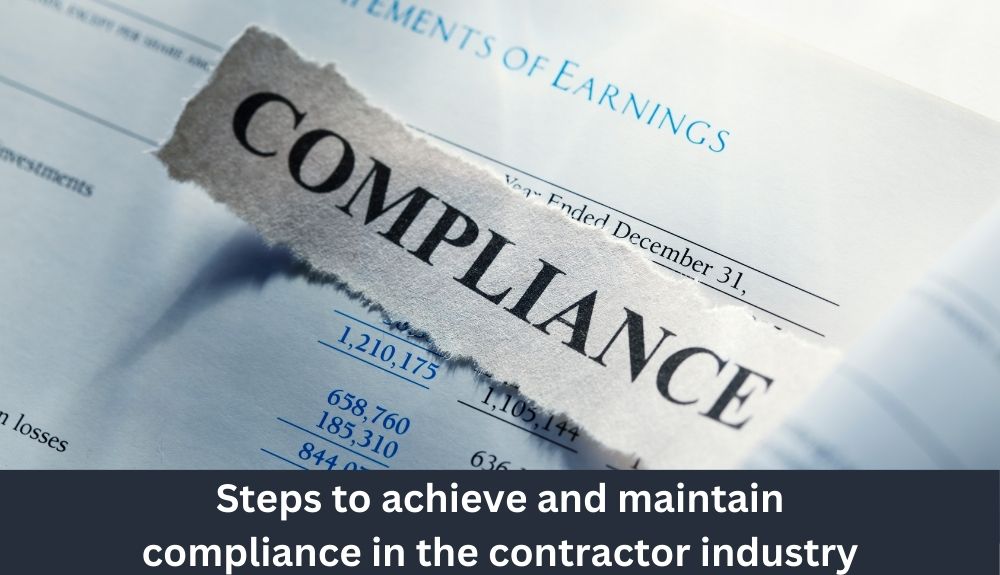
By alphacardprocess February 13, 2024
In today’s digital age, where data breaches and cyber attacks are becoming increasingly common, protecting sensitive client information has never been more crucial. This is especially true for contractors who handle payment card transactions as part of their business operations. Failure to comply with Payment Card Industry Data Security Standards (PCI DSS) can result in severe penalties and reputational damage.
But what exactly is PCI compliance? Why is it so important for contractors? And how can they ensure that they meet the necessary requirements while safeguarding client data?
In this blog post, we will delve into the world of PCI compliance within the contractor industry. We will explore the key steps needed to achieve and maintain compliance standards, discuss common challenges faced by contractors in meeting these requirements, highlight best practices for protecting client data, and examine the role of technology in achieving PCI compliance.
So whether you’re a general contractor or a specialized trade professional, buckle up as we guide you through the ins and outs of ensuring PCI compliance in your contracting business!
Why is PCI Compliance important for contractors?
In today’s digital world, where sensitive data is at risk of being compromised, ensuring PCI compliance has become an essential requirement for businesses in all industries, including contractors. PCI compliance stands for Payment Card Industry Data Security Standard and refers to a set of security standards established by the major credit card companies to protect customer payment information.
For contractors who handle client payments through credit cards or other electronic means, maintaining PCI compliance is crucial. Failure to comply with these standards can have severe consequences such as financial penalties, legal liabilities, damage to reputation and loss of business opportunities.
By achieving and maintaining PCI compliance, contractors demonstrate their commitment to safeguarding their clients’ payment data. This not only helps build trust with customers but also reduces the risk of data breaches that could potentially result in identity theft or fraudulent activities.
Achieving and maintaining PCI compliance requires contractors to implement various security measures such as encryption protocols, secure network infrastructure, access controls and regular monitoring of systems for vulnerabilities. It involves conducting regular assessments and audits conducted by certified professionals to ensure ongoing compliance.
Contractors must also educate their staff on proper handling procedures for client payment information and enforce strict policies regarding data protection. Regular employee training sessions are necessary to keep everyone updated on the latest security threats and best practices for protecting customer data.
One common challenge faced by contractors in maintaining PCI compliance is dealing with legacy systems that may not meet current security requirements. Upgrading outdated software or hardware can be costly but it’s a necessary step towards ensuring compliance. Contractors should prioritize investing in robust technology solutions that provide built-in security features specifically designed for handling sensitive payment information securely.
Furthermore, implementing strong password policies, using multi-factor authentication methods whenever possible and regularly patching software vulnerabilities are additional steps that can significantly enhance overall cybersecurity posture against potential attacks.
In conclusion, PCI Compliance is vital for contractors as it safeguards client payment data from unauthorized access while building trust with customers. Contractors must understand the requirements of PCI DSS, implement necessary security measures
Understanding the requirements of PCI DSS
Understanding the requirements of PCI DSS (Payment Card Industry Data Security Standard) is crucial for contractors in order to ensure the security and protection of their clients’ data. PCI DSS is a set of guidelines and regulations created by major credit card companies to establish standards for the secure handling, storage, and transmission of cardholder information.
To achieve compliance with PCI DSS, contractors must meet several key requirements. These include maintaining a secure network infrastructure, implementing strong access controls and authentication protocols, regularly monitoring and testing systems for vulnerabilities, encrypting sensitive data both in transit and at rest, and having comprehensive policies and procedures in place to address security incidents.
Compliance with these requirements not only helps protect client data from unauthorized access or breaches but also enhances the reputation of contractors as trusted service providers who take data security seriously. By demonstrating adherence to PCI DSS standards, contractors can instill confidence in their clients that their sensitive information will be handled securely.
However, achieving compliance with PCI DSS can be challenging for many contractors due to various factors such as limited resources or lack of expertise in cybersecurity practices. It requires ongoing efforts to maintain compliance as new threats emerge and technology evolves.
Contractors should consider adopting best practices like conducting regular risk assessments, educating employees about proper data handling procedures, implementing multi-factor authentication measures, using firewalls and intrusion detection systems to monitor network traffic effectively.
Additionally, contractors should stay updated on changes in industry regulations related to payment processing technologies.
They may also need to engage third-party vendors who specialize in providing secure payment processing solutions that align with PCI DSS requirements.
In conclusion, Understanding the requirements outlined by PCI DSS is essential for contractors operating within the contractor industry. By ensuring compliance with these standards, contractors can safeguard client data against potential cyber threats while maintaining their reputation as reliable service providers.
Steps to achieve and maintain compliance in the contractor industry

To ensure PCI compliance in the contractor industry, it is crucial to follow a set of steps that will help protect client data and maintain compliance standards. These steps include:
1. Assessing your current situation: Start by conducting an audit of your systems, processes, and policies to identify any potential vulnerabilities or areas where you may not be meeting compliance requirements.
2. Implementing encryption measures: Encrypt all sensitive data, both at rest and in transit. This will help safeguard information from unauthorized access or interception.
3. Restricting access: Limit employee access to customer cardholder data on a need-to-know basis. Implement strong authentication measures such as unique login credentials for each user.
4. Regularly updating software and systems: Keep all software and systems up to date with the latest security patches and updates to address any known vulnerabilities.
5. Conducting regular security awareness training: Educate employees about best practices for handling customer data securely, including how to detect phishing attempts or suspicious activities.
6. Monitoring network activity: Deploy intrusion detection systems (IDS) or intrusion prevention systems (IPS) that monitor network traffic for suspicious behavior or potential breaches.
7. Conducting periodic vulnerability scans: Perform regular vulnerability scans on your network infrastructure to identify any weaknesses that could be exploited by attackers.
8. Maintaining documentation: Document all policies, procedures, audits, risk assessments, and incident response plans related to PCI compliance efforts for future reference and auditing purposes.
By diligently following these steps, contractors can significantly reduce their risk of non-compliance penalties while effectively protecting client data from unauthorized access or theft.
Common challenges faced by contractors in maintaining compliance
Contractors play a crucial role in various industries, from construction to IT services. With the ever-increasing importance of data security, it is essential for contractors to maintain compliance with PCI DSS (Payment Card Industry Data Security Standard). However, ensuring and maintaining compliance can be quite challenging.
One common challenge faced by contractors is the complexity of understanding and implementing the requirements of PCI DSS. The standard consists of 12 overarching requirements and numerous sub-requirements that can often be overwhelming for those without specialized knowledge in data security.
Another challenge lies in keeping up with evolving technologies and emerging threats. As technology advances at a rapid pace, new vulnerabilities are discovered regularly, making it necessary for contractors to stay updated on the latest security measures and adapt their practices accordingly.
In addition, contractor businesses often face resource constraints when it comes to dedicating time, personnel, and financial resources towards achieving compliance. Limited budgets may hinder their ability to invest in robust cybersecurity systems or hire dedicated staff members solely focused on data protection.
Furthermore, contractors frequently encounter difficulties when working with third-party vendors who may not have stringent security measures in place. This poses a risk as sensitive client data could potentially be compromised through these external partnerships if proper due diligence is not conducted prior to engagement.
Maintaining ongoing compliance can prove challenging due to internal factors such as employee negligence or lack of awareness regarding best practices for handling sensitive information. Training employees on proper data handling procedures becomes paramount but requires continuous effort and reinforcement.
In conclusion, Maintaining PCI compliance within the contractor industry presents several challenges that require proactive efforts from organizations operating within this field. Overcoming obstacles like understanding complex regulations, adapting quickly to technological advancements while managing constrained resources are vital steps towards protecting client data effectively while fulfilling legal obligations.
Best practices for protecting client data and avoiding non-compliance penalties
Protecting client data and avoiding non-compliance penalties is crucial for contractors in maintaining PCI compliance. To ensure the highest level of security, there are several best practices that contractors should follow.
It is essential to limit access to sensitive information. Contractors should only grant access to client data on a need-to-know basis. Implementing strong user authentication protocols and regularly reviewing user permissions can help prevent unauthorized individuals from accessing sensitive information.
Encryption plays a vital role in safeguarding client data. Encrypting both stored and transmitted data adds an extra layer of protection against potential breaches or thefts. Utilizing industry-standard encryption algorithms ensures that even if data falls into the wrong hands, it remains unreadable.
Regularly updating software systems and patches is another important practice for protecting client data. Outdated software often contains vulnerabilities that hackers can exploit to gain unauthorized access to sensitive information. By keeping all systems up-to-date with the latest security patches, contractors can minimize these risks.
Implementing robust network security measures is also critical in protecting client data. Firewalls, intrusion detection systems (IDS), and secure Wi-Fi networks are some examples of effective network security tools that can help detect and prevent unauthorized access attempts.
Regular monitoring and auditing of system logs can provide valuable insights into any suspicious activities or potential breaches. Having a comprehensive log management system allows contractors to identify anomalies promptly and take appropriate action before they escalate into significant threats.
By following these best practices for protecting client data, contractors can minimize the risk of non-compliance penalties while ensuring their clients’ trust in their ability to handle sensitive information securely.
The role of technology in achieving and maintaining PCI Compliance

Technology plays a crucial role in helping contractors achieve and maintain PCI compliance. With the ever-increasing reliance on digital systems and online transactions, it is essential for contractors to leverage technology to protect client data effectively.
Encryption technology is paramount when it comes to securing sensitive information. By encrypting data during storage and transmission, contractors can ensure that even if unauthorized access occurs, the stolen data would be useless without the decryption key.
Robust firewalls are vital for protecting networks from external threats. Contractors should invest in state-of-the-art firewall software that can detect and block any suspicious activity or attempted breaches.
Implementing secure payment gateways is another technological measure that can greatly enhance PCI compliance. By using trusted third-party payment processors with secure coding practices, contractors can reduce their own risk exposure while ensuring seamless payment experiences for clients.
Regular vulnerability scanning and penetration testing are also facilitated by technology solutions. These tests help identify vulnerabilities within contractor systems before they can be exploited by cybercriminals.
Implementing strong authentication measures such as multi-factor authentication (MFA) adds an extra layer of security to contractor systems. MFA requires users to provide multiple forms of verification before accessing sensitive information or performing critical tasks.
Technology serves as both a tool and a solution when it comes to achieving and maintaining PCI compliance in the contractor industry. By leveraging encryption protocols, firewalls, secure payment gateways, vulnerability scanning tools, and strong authentication measures like MFA; contractors can better safeguard client data against potential threats while staying compliant with industry standards.
Conclusion
Protecting client data and maintaining PCI compliance standards is crucial for contractors in today’s digital landscape. By adhering to the requirements of the Payment Card Industry Data Security Standard (PCI DSS) and implementing best practices, contractors can ensure the security of sensitive information and avoid potential penalties for non-compliance.
Achieving and maintaining PCI compliance requires a comprehensive approach that encompasses people, processes, and technology. Contractors must educate their employees about data security practices, implement robust policies and procedures, regularly monitor systems for vulnerabilities, conduct thorough risk assessments, and stay updated on changes to PCI DSS requirements.
In addition to these steps, contractors should also leverage technology solutions that enable secure payment processing, encryption of cardholder data transmission, access controls for authorized personnel only, network segmentation to minimize potential breach impact areas, regular system updates and patch installation along with strong firewalls implementation.
While achieving full PCI compliance may present challenges due to evolving threats and complex regulatory landscape; by following best practices outlined in this article – such as conducting regular internal audits or engaging third-party experts when needed – contractors can proactively protect client data while simultaneously mitigating risks associated with non-compliance.
By prioritizing PCI compliance measures within their organizations from top management down to frontline staff members working directly with customer payment details; contractors can build trust among clients who value privacy protection as well as enhance overall business reputation through demonstrating commitment towards safeguarding sensitive financial information.
Remember: Compliance is an ongoing process rather than a one-time achievement. By continuously evaluating systems against new threats emerging from cyber criminals’ ever-evolving tactics; remaining vigilant about industry regulations updates or emerging technologies security trends – you will be better positioned to maintain high levels of security required in contractor industry while protecting your clients’ valuable assets!